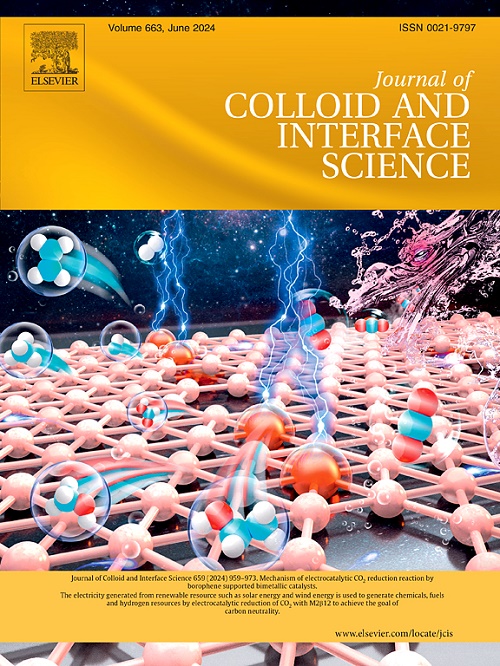Versatile corn starch-based sustainable food packaging with enhanced antimicrobial activity and preservative properties
IF 9.4
1区 化学
Q1 CHEMISTRY, PHYSICAL
引用次数: 0
Abstract
Biodegradable active packaging has garnered significant research interest owing to growing concerns over plastic pollution and food safety. However, current food packaging materials still suffer from drawbacks such as complex synthesis processes, high production costs, and inadequate safety performance in terms of antimicrobial resistance and biodegradability. Typically, their performance in preserving fresh food is also inferior to that of plastics. Herein, a versatile corn starch-based sustainable food packaging (DC) was proposed, utilizing natural corn starch (CS) and carboxymethyl chitosan (CMCS) as raw materials. The focus was on evaluating the mechanical properties, antioxidant properties, and antimicrobial activity, and to further explore the degradability and biocompatibility of the DC films, as well as their application in fruit preservation. The results confirmed the good water vapor barrier properties, antioxidant activity (DPPH scavenging of the DC4 film reached 98.10 ± 0.32 %), Ultraviolet (UV) resistance (more than 99.8 % absorption of both UV-A and UV-B radiation), water resistance, mechanical properties, and bacteriostatic and bactericidal effect (the DC4 film reached 99.67 ± 0.58 % against Escherichia coli and 99.83 ± 0.29 % against Staphylococcus aureus) of the DC. Meanwhile, the DC exhibited favorable biodegradability in the natural environment. Finally, fruit preservation experiments confirmed that the DC could significantly extend the shelf life of fresh fruits at room temperature. Overall, this research presented a sustainable and cost-effective biomass-derived packaging film that could replace conventional petroleum-based plastics, thereby reducing environmental pollution and showing significant potential for use in food packaging.

多功能玉米淀粉为基础的可持续食品包装,具有增强的抗菌活性和防腐性能
由于人们对塑料污染和食品安全的担忧日益增加,可生物降解的活性包装引起了人们极大的研究兴趣。然而,目前的食品包装材料仍然存在合成工艺复杂、生产成本高、耐微生物性和生物降解性方面的安全性能不足等缺点。通常,它们在保存新鲜食品方面的性能也不如塑料。本文以天然玉米淀粉(CS)和羧甲基壳聚糖(CMCS)为原料,提出了一种多功能玉米淀粉基可持续食品包装(DC)。研究了DC膜的力学性能、抗氧化性能和抗菌性能,并进一步探讨了DC膜的可降解性和生物相容性及其在水果保鲜中的应用。结果表明,DC4膜具有良好的水蒸气阻隔性能、抗氧化能力(DPPH清除率达98.10±0.32%)、抗紫外线(UV)能力(对UV- a和UV- b辐射的吸收率均大于99.8%)、耐水性、机械性能、抑菌和杀菌效果(对大肠杆菌和金黄色葡萄球菌的吸收率分别为99.67±0.58%和99.83±0.29%)。同时,DC在自然环境中表现出良好的生物降解性。最后,水果保鲜实验证实,DC可以显著延长新鲜水果在室温下的货架期。总的来说,这项研究提出了一种可持续的、具有成本效益的生物质衍生包装膜,可以取代传统的石油基塑料,从而减少环境污染,并在食品包装中显示出巨大的潜力。
本文章由计算机程序翻译,如有差异,请以英文原文为准。
求助全文
约1分钟内获得全文
求助全文
来源期刊
CiteScore
16.10
自引率
7.10%
发文量
2568
审稿时长
2 months
期刊介绍:
The Journal of Colloid and Interface Science publishes original research findings on the fundamental principles of colloid and interface science, as well as innovative applications in various fields. The criteria for publication include impact, quality, novelty, and originality.
Emphasis:
The journal emphasizes fundamental scientific innovation within the following categories:
A.Colloidal Materials and Nanomaterials
B.Soft Colloidal and Self-Assembly Systems
C.Adsorption, Catalysis, and Electrochemistry
D.Interfacial Processes, Capillarity, and Wetting
E.Biomaterials and Nanomedicine
F.Energy Conversion and Storage, and Environmental Technologies

 求助内容:
求助内容: 应助结果提醒方式:
应助结果提醒方式:


